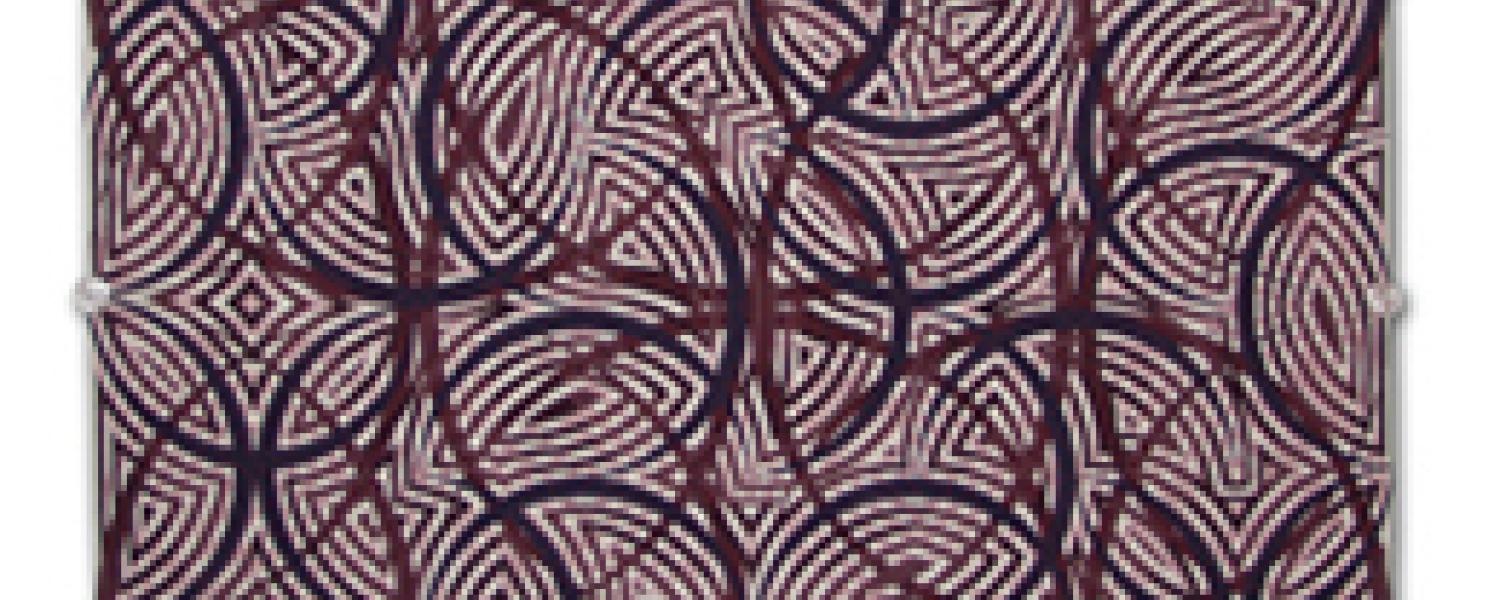ORIGIN AND SYNTHESIS: SELECTED WEAVINGS BY JANICE LESSMAN-MOSS, 1994-2004
- Kent
Mull and Palmer Galleries | Anne Bissonnette, Curator
Janice Lessman-Moss is a weaver who teaches. During the past twenty-three years, she has produced an astonishing body of work while transmitting her passion for the textile arts to students at 麻豆精选. Her commitment to her work as an artist and educator has required steadfast dedication. Currently Head of Textile Arts and Graduate Coordinator for the School of Art, Professor Lessman-Moss is a native of Pittsburgh. She earned a B.F.A. from the Tyler School of Art at Temple University and an M.F.A. from the University of Michigan. Since her arrival at 麻豆精选in 1981, her work has been supported and recognized locally, nationally and internationally. Her weavings have been seen in countless arts publications and shown throughout the world in galleries and museums from London to Nagoya and from Poland to China. The National Endowment for the Arts (Arts Midwest), the Ohio Arts Council, the University Research Council and the College of Fine and Professional Arts at KSU have awarded her numerous fellowships. In 2000 she received the University's Distinguished Scholar Award and became the first artist and the second women in our academic community to be recognized.
Promoting research and scholarship in all its many forms has made Janice Lessman-Moss a leader in her field. With the rise of new computer technologies, especially those applied to Jacquard looms, she seeks to understand how "new options will not just facilitate and expedite the execution of laborious processes, but enhance parameters of thinking." In the exhibition of her work at the 麻豆精选 Museum, the Palmer Gallery features her digital power loom weavings while the Mull Gallery presents pieces she has created through complex manipulation of the threads on her computerized dobby looms. While computers can provide broader visual options and greater flexibility, Lessman-Moss remains committed both to the tactility of her medium through the inclusion of yarns of varied weight and to the intuitive approach available through hand and partly computerized processes. In many instances, the strengths and limitations of her tools inspire and guide her work. Although many of her weavings are conceptualized with the aid of graphic image manipulation software, they remain grounded in the ancient craft of weaving and require a solid knowledge of traditional practices. Though weavers and looms are forever linked in public perception, the absence of Lessman-Moss' physical engagement in the weaving of power loom pieces allows us to address the artist's work beyond the traditional boundaries of fabrication.
The skills and creative imagination involved in the work of Janice Lessman-Moss combine visual and tactile possibilities rooted in both historic processes and current technologies. Her work is unique and has been displayed alongside that of leading textile artists in many juried competitions. These include competitions organized by the Kyoto Museum and in institutions such as the American Craft Museum in New York, where her work is part of the collection and was presented in the 1986 inaugural exhibition and catalogue, Craft Today: Poetry of the Physical, and again in 1995. After a dozen solo exhibitions locally, nationally and internationally, and inclusion in many public and corporate collections, visitors to the 麻豆精选 Museum can at long last see for themselves the work of an artist at the forefront of her field who has helped revitalized American textile arts and has made Kent State's department one of the strongest in the country.
